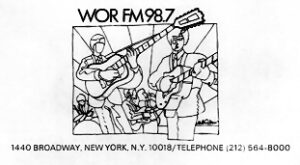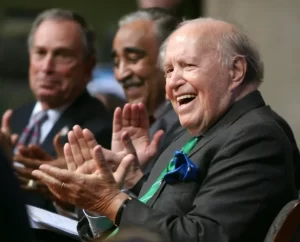Corporate Underground

Corporate underground? An oxymoron you might say. Yet the origins of underground radio in the latter half of the Sixties was at least partly the result of corporate initiative. Or, perhaps, corporate perplexion. The consequences of that curiosity reverberated through the years in very different directions.
New FCC regulations in 1966 were intended to develop the FM market. Stations no longer could simply simulcast the blather from their AM affiliates, which meant that new programming had to be developed and new personnel hired. It opened up any number of possibilities in the near term.
FM stations tended to have weak signals and thus smaller markets, but they did have the advantage of high fidelity stereophonic technology. Most records though were released in monaural, since the target market was AM radio and that’s all they could play. That was one issue to wrestle with. Another was that going Top 40 separately on FM would only erode the audience for your already successful AM station.
One corporate entity that was facing a decision was RKO General Broadcasting, which owned several successful stations around the country, including WOR-AM & FM in New York City. Their modus operandi was the programming developed by media consultant Bill Drake, consisting of Top 40 hits with jingles, contests, and promotional schemes assaulting the airwaves like incoming missiles in a war zone. The suits at RKO were loathe to vary that formula but didn’t want to tamper with the AM radio audience. So, what to do?

Enter the Bridge. There were a few radio personalities at these big market stations who had enough of a following that they commanded respect. One reason was that they actually cared about the music and not just the ratings. It’s all about money on the corporate side and a following equates to dollars, so maybe we should listen to them. Right? They were the bridge between the music, the audience who wanted to hear it, and the avarice wanting to exploit it. They helped the suits dip a toe in the waters of the new WOR-FM.
One of them was Murray Kaufman, the semi-famous “Fifth Beatle” Murray the K. Another was the very talented and highly respected Bill (Rosco) Mercer. They and colleagues Scott Muni and Johnny Michaels began playing some of the new music, the stuff that didn’t fit on Top 40, songs that ran four or maybe five minutes long instead of the sacrosanct 2:45. It wasn’t freeform. Far from it. But it was different. (HERE)
Some people say it was the first “progressive rock station.” They played songs by artists like Janis Ian and Procol Harum who were writing not hits but songs that meant something. There was still a fair amount of nonsense, promotions, segments like Fifties rock and roll hour, but there was a maturity and respect in the way the deejays presented it.
Whatever you call it, it was notable for one specific reason: it attracted a new audience to radio. College kids were digging it. People who listened infrequently to Top 40, mostly in cars driving from place to place, were spending hours a day with WOR-FM on quality stereo equipment at home. It was a harbinger of things to come.
So was the way the suits dealt with it. In less than a year, they began to exert “control.” Don’t play that. Do play this. We have a consultant (the exalted Bill Drake) who says: do it this way. No thanks said Murray the K. Not on your life said Rosco Mercer, who resigned on the air.
On his last show, without warning the station’s management, Rosco spoke for five minutes about why he was resigning, saying, ”When are we going to learn that controlling something does not take it out of the minds of people?” and declaring, ”In no way can I feel that I can continue my radio career by being dishonest with you.” He added that he would rather return to being a men’s-room attendant. (HERE}

He and Scott Muni went to WNEW-FM and launched a giant of freeform radio, perhaps the very first of that genre, in October of 1967. At virtually the same time, Tom Donahue was creating freeform radio from whole cloth at KMPX-FM in San Francisco. What he called “spontaneous discovery” spread the concept very quickly to pockets of the more adventurous, the revenue starved, or like RKO, the corporate types who hadn’t at least for the moment a clue.
Freeform radio in its various guises didn’t last long at commercial stations. Those once neglected frequencies of the FM band suddenly had rapidly increasing value. The corporate types gleaned enough inspiration from what those underground radio types had shown them to create an ersatz, predictable, tightly controlled, algorithmically driven, and very profitable version of “album oriented,” “progressive” or “classic rock and roll.”
Why did it matter? you ask. What was gained and what was lost? The FCC had acted to stimulate the development of the FM market and that was accomplished in a very big way. Those stations became very valuable and a lot of people made a lot of money from them. The public airwaves were made hugely profitable but they were not enriched. Nor was the audience they are intended to serve.
The development of that spectrum and subsequent rulings that vacated restrictions on overlapping ownership of media outlets began a trend toward centralization that has made “public” airwaves a joke. They are corporate tools that broadcast propaganda and mint money for their owners. They control the message the public receives and it is not surprising that message is what benefits them rather than their audience. And there are precious few of them who exert that control. As Paul Harvey would say: and now the rest of the story.

There was a guy named John Kluge, a German immigrant with a flair for business who realized the dream of every American entrepreneur by becoming at one point in his career the second richest person in the country. He liked to buy companies and did so with the savvy if some said audacious use of debt.
Among those businesses he gobbled up were radio and television stations under the corporate name Metromedia. At one point, that entity owned seven television stations and 14 radio stations in the nation’s largest media markets, including New York City, Los Angeles, Philadelphia, Washington, D.C., Detroit, Dallas, and Tampa-St. Petersburg.
What he accomplished beyond great wealth for himself was beginning a relentless march toward centralized control of the nation’s media in the hands of very few individuals. He sold his television stations to an Australian mogul named Rupert Murdoch in 1985 and gave birth to Fox Network. The last of his radio stations, which were located in six of the nation’s ten largest markets, were sold in 1986 for some $300 million, the biggest radio sale ever. (HERE)

Today, those numbers pale beside the totals that corporate media mavens have aggregated since the FCC and federal courts removed limits on media ownership by single entities. Clear Channel itself owns over 1200 radio stations. Its iHeart branded stations are ubiquitous as the pandemic but without a viable vaccine. The top six radio corporations together reach 100% of the listening audience in the country. (HERE)
It matters for many reasons, but here the subject is underground radio in the hands of corporate titans to be. We talk about the value of diversity a lot these days, yet the public airwaves that might carry that message are anything but diverse. What was once a media landscape of potential to house such curatorial artistry on behalf of the audience as that which graced freeform radio (and not incidentally made possible the classic era of rock & roll) is now an artistic wasteland controlled by people with sophisticated algorithms, insatiable hunger, and only one purpose: to maximize profit. Well, maybe another purpose, as well: to tighten their control of the message that so greatly benefits them. With public airwaves, no less. C’est la guerre!
The story you tell is not just deftly written and fascinating to read but tells an eye opening and crucially important tale that is as relevant as it is new and news worthy.
Thanks for teaching me something
Of importance today in a way that is most enjoyable!
Pleased to hear from you, Alan, and glad you enjoyed the article. Thanks for reading!